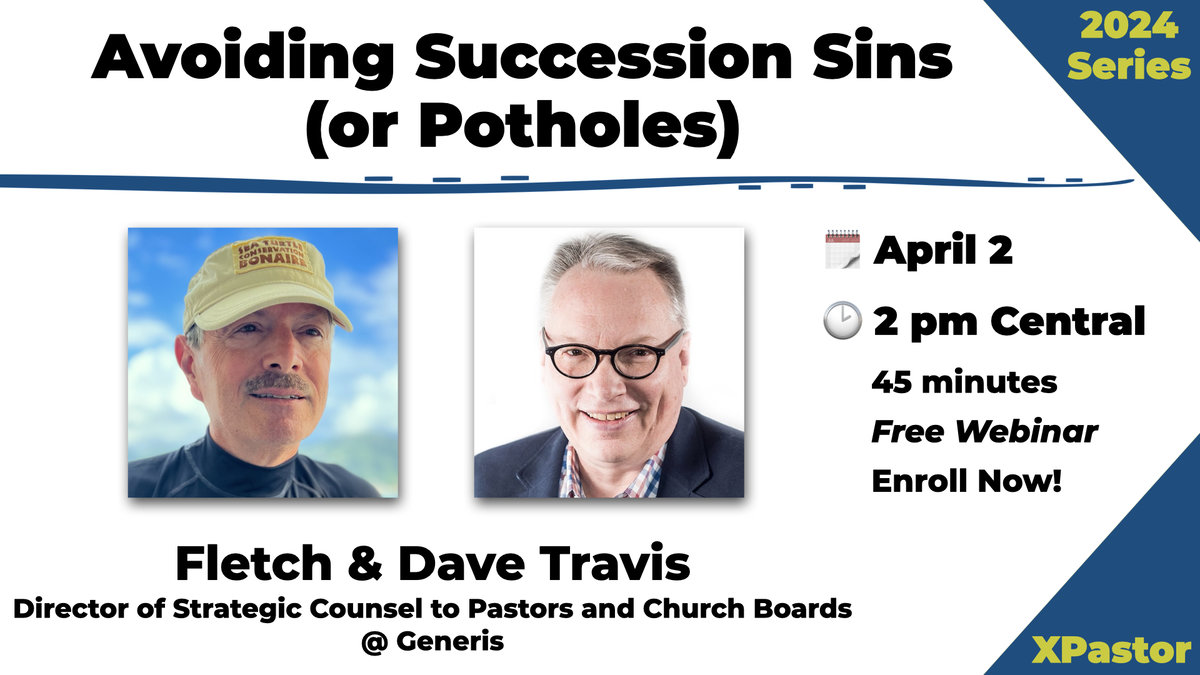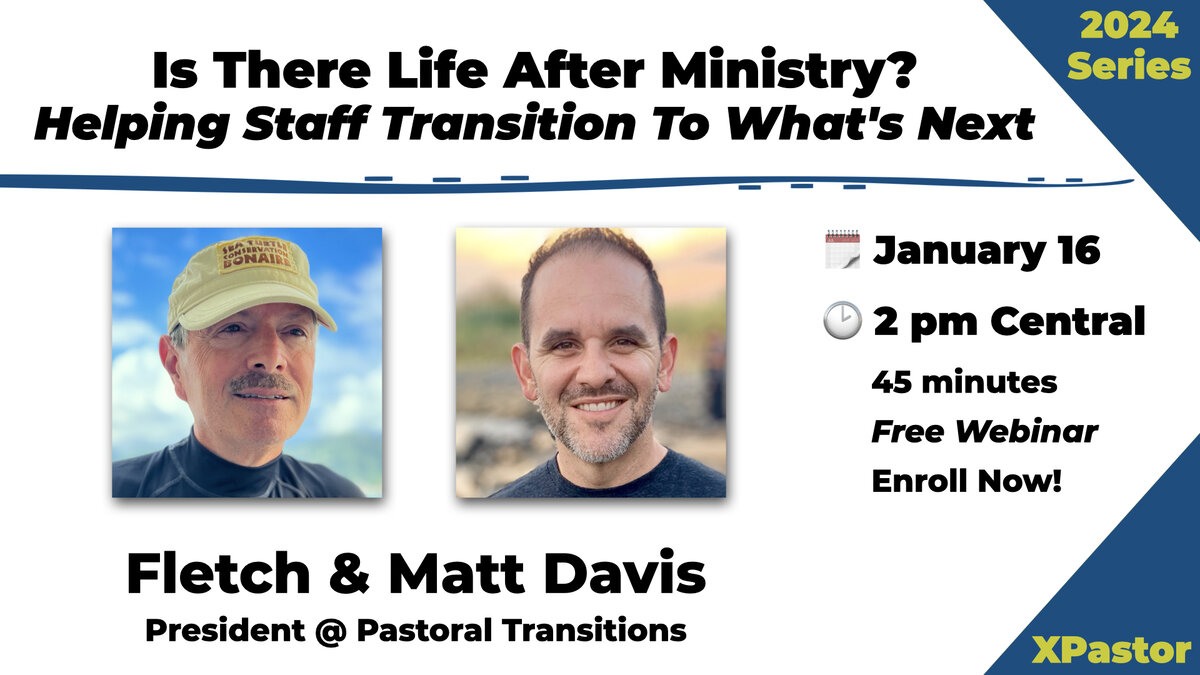I had serviced my second congregation a long time, when I began asking myself, “How do I know when it’s time to leave?” I had friends who were very good pastors, but they didn’t know when to leave. They overstayed. They were deeply hurt. Their churches went from a plateau into a decline. While I was not without my challenges and pain, the ministry was moving ahead. I wasn’t sure how much I should listen to my critics. I was sure I didn’t want to overstay.
My friend, Ray was in town. A Senior Pastor widely respected, he had served the same church for decades. I was looking forward to having breakfast together and picking his brain.
As we sat down at the table and quickly ordered our eggs, I came right to the point, “Ray, how do you know when it’s time to leave your church?” He began to laugh. Then he explained, “I’ve been asking myself that question for years.”
I found his response encouraging. I was not alone. But he didn’t answer my question. So I pressed on. My pilgrimage and prayerful observations have brought me to some conclusions.
One denominational leader told me, “Guys are not reading the signs and when they do, they don’t know how to respond.” Well, I wanted to ask, what are the signs? What are the expectations of my leaders, the church I serve, and God?
What are not the “signs”?
1. Opposition.
We are in a spiritual warfare. As leaders, we are marked men and women. The enemy is out to destroy our credibility and us. He uses the evil forces of the unseen world and some negative saints. Moses had grumblers for forty years. Opposition is not the sign to leave. It only means that we are in the fight.
2. Pain.
Being a leader means taking a lot of shots. We are called not only to believe this gospel, but to suffer for it (Phil. 1:28). Jesus’ life and ministry concluded with the pain of rejection, the sufferings of Gethsemane and the agony of the cross. Paul’s life tells us that servanthood, sacrifice and suffering are the tools that God uses for us to become His person in the life of others. Sorry, but having pain is not a ticket out.
3. Depression.
The world being what it is and the battle being what it is, depression will naturally result. When we expend high levels of adrenaline, we are going to feel a let down, especially when things aren’t all going our way. David had a full-blown depression when he returned from battle to find that the Amalekites had raided their base at Ziklag and taken all their wives and children (1 Sam. 30). Elijah had one too. It wasn’t a sign for them to quit. I hardly ever felt like quitting—except on Mondays or right after a Board meeting, or other times when my self-esteem was threatened. Some depression is normal. It is not a sign to quit.
4. Not enough money or staff.
These are chronic problems with a growing church. Enough money and staff may mean you have plateaued. A shortage of money and staff is simply how it is in most churches. It is not a sign to leave.
5. Your church is not growing just now.
Churches grow in spurts. It is like a good mutual fund. It’s the long term growth that counts. Some years are just bad. It may be a pruning time for your congregation. Better cool your itching feet. It is probably not time for you to leave.
6. Self-doubt.
Can I really do this? I’m not adequate. It’s probably true. Now is the time to “Be strong in the Lord and the power of his might.” It was good counsel for Joshua when he had to follow Moses. God’s power does work best in our weakness. Your weakness is not an excuse to bail out. It qualifies you for God to work in and through you in a way that will astonish the world system.
7. Some people have left.
This may be a good sign. Some folks need to leave. The pioneers who resist all change cannot ever stand in the way of what God might be doing. Some are never going to be happy where they are unless they can be in power. Having people leave is never fun, but it is not your excuse to also leave.
These problems are not insignificant. They often drain us. But in and of themselves, they are not a sign to leave. They represent something of the cost of ministry which all of us are called to bear.
When the pressure is on, most of us leave too quickly. There is strong evidence that the most productive years for a pastor are after he or she has been with the congregation five years.
What are some possible signs?
Here are some events that may be saying something about your future:
1. They are not following my leadership.
All of us “lose” some issues we think are really important. When we lose too many of these, it may be a sign. It was not a happy day when I began to realize that a well-respected key man on my board was skillfully opposing most ideas that I was bringing forth. He was a part of a small, but strong group. I had some rough water ahead. Some significant people were not following my leadership. There is also caution here. You may have to stop a rebellion. Like Israel of old, some saints are prone to disobedience and rebellion. They need a firm hand of correction with a gentle spirit. Once when I was giving serious consideration to a move, I counseled with my district superintendent. He was aware of a power struggle going on in our congregation. I told him I was thinking of leaving. “Not until you get this one steeled,” he responded. Sometimes we have to correct a situation before someone else can follow us.
2. Lack of growth for a sustained period.
If the church has been in decline for three or more years, this could be a significant sign.
3. Lack of spiritual growth in the congregation is always a concern for a godly pastor.
If the people are showing no signs of maturation, this is saying something. When I am no longer growing can also be a sign. God wants me to keep growing in His grace and in my skills. Long-term stagnation is not God’s norm.
4. When I am not fitting in.
When culturally there is a mismatch, and I am not making the change. If I’m not adjusting to the times I become an obstacle. Or perhaps there is an unresolved conflict with the staff or Senior Pastor or the Board. When I’ve tried every way I know for reconciliation and have sought help, but there’s no solution, this may be a sign. As a staff person, if I can no longer be loyal to my Senior Pastor, I should leave immediately.
5. When new leadership (not necessarily better) would better serve the church.
Sometimes folks have become so accustomed to our voice they have turned us off. A fresh voice can provide new motivation. Having served this church for a long time, I had led through three major building programs plus some property acquisition. Even with a commitment to three Sunday morning services, we still needed more facilities. All agreed. But the people had heard it from me for so long it was a bit like, “Yes, Don, we have heard you say that before.” A fresh voice was needed.
6. A unique opportunity presents itself that perhaps I’m especially gifted for.
It may not necessarily be a larger opportunity. It can be simply a place where my gifts are needed; another congregation, an administrative job, or a move to another organization.
7. When my family is hurting and will be injured because of the situation,
Our first call to ministry is to our spouse and children. We cannot move simply because they would like it better some place else. But where their physical or spiritual welfare is at stake, I must listen to what God might be saying.
8. If you have failed morally or ethically.
You and the church need time to heal. You will want to be under accountability, but you need to resign. To receive discipline now is crucial.
What about God’s will?
What about when others have not been honest or fair. Is it right that I should be taken advantage of? And what about some of the plain lies that have been told about me? Most of us feel at least some of this in any move.
I well remember a time when a trusted staff member had become deceitful. He had gathered a couple of followers. The church finances were not good. Several complainers had become vocal. These circumstances didn’t seem to fit my vision of ministry.
Jesus experienced all the above. Not because it was fun, but because He was committed to doing the Father’s will. Doing the Father’s will still has its cost. A servant is not greater than his Master. It is going to happen to us. I have been surprised when I was rejected by people whom I loved. Being persecuted for doing what I believed to be right seemed hard. It hurts to have your character questioned. Even if the people mean it for evil, God will use it for good. And part of that good may be a move I don’t want to make.
We tend to be too subjective in our decision making. I need to remember that the scriptures are clear that God’s will is for me:
- To become Christ-like. He uses even bad people to do good in us. He wants me to live righteously.
- To invest my life in people. To love people and to use things. Not the other way around.
- To be a vital part of the local body of believers. To stay close to the church. To be supportive. To not become a critic.
We too often think geography is the important issue. It is not. We can serve equally well in several places. A.W. Tozer used to say, “God leads his sheep to green pastures, but He doesn’t mind which turf of grass they chew on.”
I have no neat three-step formula for knowing when it’s time to make a change. But these guidelines do have merit. Use them while:
- Holding fast on the great principles of Scripture.
- Remembering that God’s Sovereignty is worked out in circumstances. He does open and shut doors.
- Seeking the confirmation of godly people.
When this is our heart, we can remind God and ourselves of such promises as Psalm 37:5 and Proverbs 3:5-6. Then, get up and do what looks best for the Kingdom of God. Either choice will be right. God will not permit His surrendered child to make a mistake.
Sometimes God’s plans are best carried out with a rest or vocational change. This doesn’t mean that I’m no longer committed to God’s will for me or His church. My calling doesn’t change, but the manner in which I carry it out could be as radical as a return to tent-making or taking up the prison life.
Henry was a mentor of mine. He profoundly affected my life. He left his mark on each of our children. He had been a pastor in his youth, but for reasons of health and family, he had become a farmer. He stayed close to pastors. He spent a lot of time with young people, though he was old enough to be their father, then their grandfather. He became perhaps the most respected person in a large church I served. Once he was honored as Citizen of the Year in our city. He served on school boards and church boards. His ministry did not stop or even slow down when he left the pastorate. He simply learned that through circumstances the Sovereign God had moved in his life. God’s call on his life had not changed, but his role was altered. New doors slowly opened to him. His life and influence expended beyond what would have ever been in the pastorate.
Many of my friends that I started out with left pastoring in the first decade. Some became disillusioned. A few bitter. Some hung on to pastoring and maybe should have made a move years before. A few of us stayed for thirty or forty years enduring the pain and enjoying great fulfillment.
Don’t be afraid to look at the signs. Deciding when to leave is not a laughing matter, even if you have wrestled with it a long time. Don’t panic. For the good of the church and your own development, you may need to stay. Seek wise counsel of godly people. But don’t be fearful about stepping out into a new area. Another church or even another role could be God’s great surprise for you.











